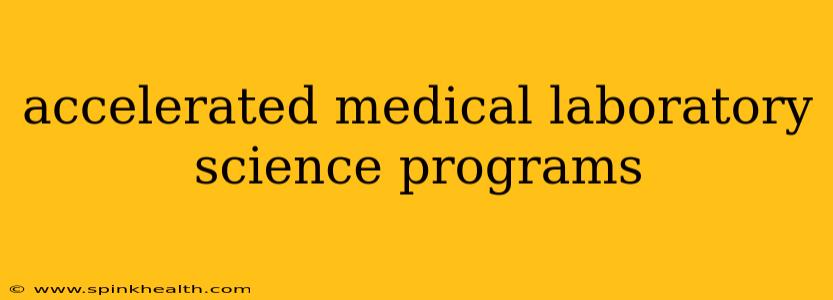The world of healthcare is constantly evolving, and with it, the demand for skilled medical laboratory scientists is booming. If you're driven, ambitious, and eager to launch a fulfilling career quickly, an accelerated medical laboratory science (MLS) program might be your perfect pathway. This isn't just a faster route; it's a meticulously designed curriculum packed with the knowledge and hands-on experience you need to excel in this critical field.
What is an Accelerated Medical Laboratory Science Program?
Imagine condensing years of study into a shorter, more intense timeframe. That's the essence of an accelerated MLS program. These programs are designed for individuals who are already holding a bachelor's degree in a related field or who are exceptionally driven and ready to commit to a rigorous academic schedule. Instead of the traditional four-year timeline, these programs can often be completed in as little as 12 to 24 months. This condensed timeframe doesn't mean a compromise on quality; it simply means a more focused, streamlined approach to learning.
Think of it like this: instead of taking a leisurely hike, you're sprinting up a mountain – it’s challenging, yes, but the view from the top is breathtaking and you get there faster.
What are the Admission Requirements for Accelerated MLS Programs?
This is where the "accelerated" part gets serious. These programs are highly competitive, and admission requirements can vary significantly between institutions. Generally, you can expect to need:
- A bachelor's degree: Often, a bachelor's degree in biology, chemistry, or a related scientific field is a prerequisite.
- High GPA: A strong academic record is essential, demonstrating your ability to handle the demanding coursework.
- Prerequisite courses: Many programs require specific science courses completed prior to admission, such as microbiology, anatomy, and physiology. This ensures you have a solid foundation.
- GRE scores: Some programs may require GRE scores as part of their application process.
- Letters of recommendation: Strong letters of recommendation from professors or supervisors in your previous academic or professional experiences can significantly boost your application.
What are the Curriculum and Courses of an Accelerated Medical Laboratory Science Program?
The curriculum is designed to equip you with a comprehensive understanding of laboratory techniques, procedures, and analytical skills. Expect to encounter courses covering:
- Clinical Chemistry: Analyzing blood and other bodily fluids to diagnose diseases.
- Hematology: Studying blood cells and their disorders.
- Microbiology: Identifying and analyzing bacteria, viruses, and other microorganisms.
- Immunology: Understanding the body's immune system and its response to disease.
- Molecular Diagnostics: Utilizing advanced techniques like PCR to detect and analyze genetic material.
- Blood Banking: Working with blood donations and transfusions.
How Long Does it Take to Complete an Accelerated Medical Laboratory Science Program?
Program lengths vary. While some might take 12 months, others could stretch to 24 months. The duration often depends on the program's intensity and the prior coursework you've completed.
How much does an accelerated MLS program cost?
Tuition fees can be significant and vary widely depending on the institution and the location of the program. It's essential to research the costs carefully before applying.
What are the job prospects after an accelerated MLS program?
The job market for medical laboratory scientists is robust and is projected to continue growing. Graduates from accelerated programs are highly sought after in various settings, including hospitals, clinics, research labs, and pharmaceutical companies.
Are there any online or hybrid accelerated MLS programs available?
While many accelerated programs are campus-based, some institutions may offer online or hybrid options, which blend online learning with limited on-campus components. The availability of these options will depend on the institution and program.
What is the difference between an accelerated MLS program and a traditional MLS program?
The primary difference is the timeframe. Traditional programs typically take four years to complete, while accelerated programs condense the curriculum into a shorter timeframe (12-24 months). This intensity requires a significant time commitment and a high level of self-discipline.
In closing, an accelerated medical laboratory science program is a challenging but rewarding pathway to a fulfilling and in-demand career. The condensed timeframe allows for a quicker entry into a field brimming with opportunities to make a real difference in people's lives. However, thorough research and preparation are key to success in these competitive programs. Remember to carefully evaluate program requirements, costs, and career prospects before making your decision.

